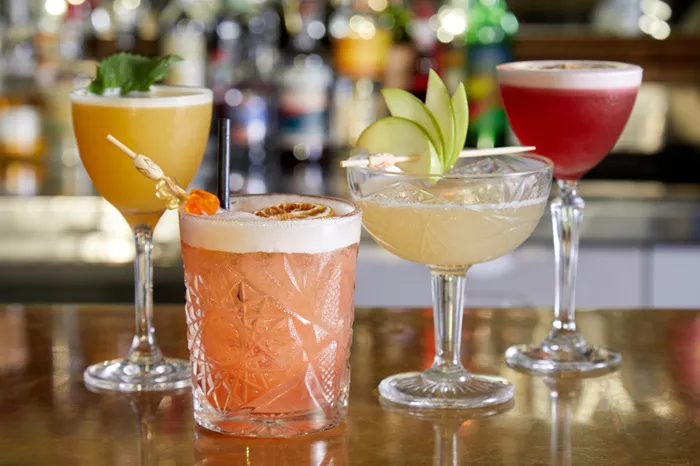Cocktails are a popular choice for many social occasions. They come in various flavors and styles, often crafted with a mix of spirits, juices, and other ingredients. While cocktails can be enjoyable, it is essential to recognize their potential alcohol content. Many cocktails are significantly stronger than a standard drink, which can lead to unexpected intoxication. Understanding the alcohol content in cocktails helps drinkers make informed choices.
In recent years, the cocktail culture has exploded. Bars and restaurants feature elaborate drinks that are visually appealing and packed with flavor. However, these creative concoctions often mask the alcohol. This article explores the reasons why cocktails can be very alcoholic. It discusses ingredients, preparation methods, and the effects of high alcohol consumption.
Understanding Alcohol Content in Cocktails
What Is Alcohol By Volume (ABV)?
Alcohol by volume (ABV) is a standard measurement used to quantify the amount of alcohol in a beverage. It represents the percentage of alcohol in a given volume of liquid. For example, a drink with 40% ABV contains 40% pure alcohol. Knowing the ABV is crucial for understanding how strong a cocktail is.
Comparing Cocktails to Standard Drinks
A standard drink typically contains about 14 grams of pure alcohol. This amount is roughly equivalent to:
- 12 ounces of beer (5% ABV)
- 5 ounces of wine (12% ABV)
- 1.5 ounces of distilled spirits (40% ABV)
Many cocktails, however, can contain multiple servings of alcohol. A single cocktail might combine several types of spirits, resulting in a much higher alcohol content than a standard drink. This discrepancy can lead to overconsumption without the drinker realizing it.
See Also: Are Cocktails Just Mixed Drinks?
Common Ingredients in Cocktails
Spirits: The Backbone of Cocktails
Spirits are the primary ingredient in most cocktails. Common types include vodka, gin, rum, tequila, and whiskey. Each spirit has its own unique flavor profile and ABV. For instance, most distilled spirits have an ABV ranging from 35% to 50%. When combined in cocktails, these spirits can create potent drinks.
Liqueurs and Their Role
Liqueurs are sweetened spirits infused with flavors. They often have lower ABV than standard spirits, typically ranging from 15% to 30%. However, they can still contribute significant alcohol content to cocktails. Popular liqueurs include triple sec, amaretto, and vermouth. Many cocktails use both spirits and liqueurs, increasing their overall strength.
Cocktail Preparation Methods
Shaken vs. Stirred
The method of preparation can also affect the alcohol content in cocktails. Shaking a cocktail mixes the ingredients thoroughly and can dilute the drink slightly through the melting of ice. Stirring, on the other hand, incorporates the ingredients without as much dilution. Cocktails that are stirred often retain a higher alcohol concentration.
Layering Ingredients
Some cocktails are designed to showcase distinct layers. These drinks may include spirits with varying densities. When poured carefully, the ingredients do not mix entirely, creating a visually stunning effect. However, this method can lead to uneven alcohol distribution. Drinkers may sip on a cocktail that is much stronger than anticipated.
Popular Cocktails with High Alcohol Content
Martini
The martini is a classic cocktail known for its simplicity. It typically contains gin and vermouth. A standard martini can have an ABV of around 30% to 40%. Variations like the dry martini may contain even less vermouth, resulting in a stronger drink.
Long Island Iced Tea
Despite its name, Long Island iced tea contains no tea. Instead, it combines vodka, gin, rum, tequila, triple sec, and sweet and sour mix. This cocktail has a high alcohol content, often exceeding 22% ABV. The sweetness of the mix can mask the alcohol, making it easy to consume.
Zombie
The zombie cocktail is notorious for its strength. It typically contains multiple types of rum, fruit juices, and a touch of grenadine. With an ABV that can reach 75%, this drink is not for the faint of heart. The fruity flavors often disguise the high alcohol content, leading to quick intoxication.
The Effects of High Alcohol Consumption
Understanding Intoxication
Consuming high-alcohol cocktails can lead to rapid intoxication. The effects of alcohol can vary based on individual tolerance, body weight, and other factors. However, higher ABV drinks generally result in quicker intoxication. Symptoms may include dizziness, impaired judgment, and decreased coordination.
Health Risks
Regular consumption of high-alcohol cocktails can pose health risks. Long-term effects may include liver damage, addiction, and increased risk of accidents. It is crucial for drinkers to be aware of their limits and make informed choices regarding their alcohol consumption.
Responsible Drinking Practices
Know Your Limits
Understanding personal limits is vital when enjoying cocktails. It can be helpful to track the number of drinks consumed and their alcohol content. Setting a limit before starting can prevent excessive drinking.
Pacing Yourself
Pacing drinks throughout an evening can help reduce intoxication. Taking breaks between cocktails and drinking water can aid in staying hydrated and sober. This practice allows for a more enjoyable experience without the negative effects of high alcohol consumption.
Conclusion
Cocktails can be delightful and refreshing, but they can also be very alcoholic. Understanding the ingredients, preparation methods, and potential effects of cocktails is crucial for responsible drinking. Awareness of alcohol content, pacing oneself, and knowing personal limits are essential for enjoying cocktails safely. With this knowledge, drinkers can savor the experience without compromising their well-being.
In the ever-evolving world of cocktails, it’s essential to appreciate both their creativity and their potency. By doing so, you can enjoy the art of cocktail making and drinking while maintaining a responsible approach to alcohol consumption.
You Might Be Interested In:


